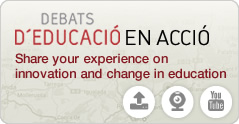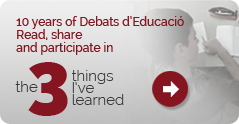- Català
- Español
- English
You are here
Collaborate, innovate and lead. The future of the teaching profession
About the speaker
John MacBeath
Professor Emeritus at the University of Cambridge
Key concepts
Some concepts on the current state of education:
- There is a paradox in education. It is a long-term investment, but it is marked by the rapid changes in the market and in government (each new government modifies the previous education law).
- We find ourselves in a new economic landscape, where knowledge is a currency.
- Schools are brimming with diversity, due to migratory movements. It is a constantly changing diversity.
- Technology has transformed the panorama. Technology users are also creators. Students are creators.
- There is a trend to maintain an education system from thirty years ago, believing it to be the best possible system. Parents support this trend. There needs to be a parent-teacher alliance to introduce change.
How the attitude of teachers has to adapt to the changes and improvements in the system:
- Teachers have to be accountable to their colleagues, and to families and students. They cannot just be accountable to their superiors. They have to be accountable in every direction.
- Good teachers do not just disseminate knowledge. They also search for and create knowledge, and they do so in the company of their students. Good teachers connect, expand and question.
- Conversations have to be established between teachers, and the right times and settings have to be found for them. Teachers have to learn from their peers and create collectively.
- Sharing assessment of students with colleagues is the best way to understand a student’s character.
How do we go from the present to the future:
- Learning has to be at the heart of everything.
- The setting has to have the optimal conditions for learning, so that students feel at home.
- There needs to be a dialogue on how to learn.
- The leadership has to be shared. The leaders are not the head teachers or directors of study. The teachers have to be the leaders, and even students can act as leaders. It has to be a collaborative leadership which should not come from the pinnacle of education, but from within the network.
Teachers need to self-evaluate. Some questions that need to be asked:
- Are we having conversations about learning?
- Does the setting motivate the teachers?
- Are we willing to share our work and problems?
- Are we stuck in a rut?
Some concepts that John MacBeath sees as marking a good education and good learning:
- Sharing, enjoyment, environment, company, active learning, practical learning, give-and-take.
- Learning has to form an integral part of the social setting and relations.
- They have to provide support, and be demanding.
- They have to be relaxed, but stay alert.
- Age should not be a factor.
- Learning has to be able to be extrapolated to life.
The order of importance of the 5 Ws and H in learning, according to John MacBeath:
- Who. With whom. The peer effect is very important.
- How.
- Why.
- Where.
- When.
- What.
The Children’s University, a success story:
A list of places for learning has been produced, including places from daily life, like airports or cemeteries. Each child has a passport where they register their visits to places listed. Once they have built up a number of hours of learning, they can take part in a university-style graduation. The experience shows how children’s attitude improves towards learning and school.
This Debate on Education is sponsored by Obra Social "la Caixa" and its Internationalization at Home Plan.
Discover
other ideas
-

The role of families in improving schools and the...
Annie Kidder
2013 -

Creating schools that prepare for the future
Richard Gerver
2013 -

Is privatization the solution? Challenges and tens...
Henry Levin
2013






 The texts published on this website are, unless otherwise indicated, covered by the Creative Commons Spain Attribution - Non Commercial - No Derivs 3.0 licence. You may copy, distribute and transmit the work, provided you attribute it (authorship, journal name, publisher) in the manner specified by the author(s) or licensor(s). You may not use the material for commercial purposes. You may not transmit any derivative work from this material. The full text of the licence can be consulted here:
The texts published on this website are, unless otherwise indicated, covered by the Creative Commons Spain Attribution - Non Commercial - No Derivs 3.0 licence. You may copy, distribute and transmit the work, provided you attribute it (authorship, journal name, publisher) in the manner specified by the author(s) or licensor(s). You may not use the material for commercial purposes. You may not transmit any derivative work from this material. The full text of the licence can be consulted here: